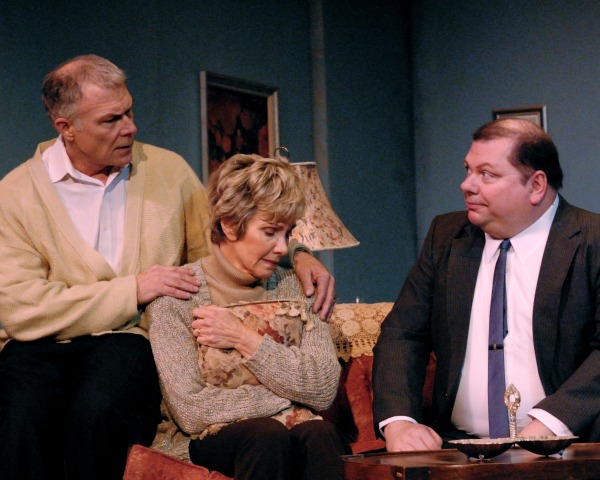
“Pack of Lies,” the espionage drama by Hugh Withemore based on true events, opens tonight at the Newport Theater Arts Center.
In 1961, Bob and Barbara Jackson (in real life Bill and Ruth Search) and their teenage daughter Julie (in real life, Gay Search), live in a quiet English town. They are friendly with their neighbors, Peter and Helen Kroger. Until the Krogers are arrested and charged with espionage, revealing their true identities – Morris and Lona Cohen.
The show is directed by Sharyn Case, who comes to NTAC with an impressive resume, directing at the Long Beach Playhouse, the Curtis Theatre, Rude Guerrilla, Vanguard, Hunger Artists, as well as assistant directing two shows with Martin Benson at South Coast Repertory.
Case has immensely enjoyed working with the seven-member cast.
“This cast is amazing, she said. I have certainly put them through their paces, in terms of challenging them with sub-texts and hidden agendas. From disbelief to grudging belief to acceptance, to acceptance of their own guilt, it’s a roller coaster of emotions. And they have always come through for me.”
This week, Rae Cohen, the executive producer of the show and president of the NTAC received a letter this from British tourist Leslie Dewhurst. The letter served as a chilling reminder that this spy drama is indeed based on real events during the Cold War in 1960.
With Dewhurst’s and NTAC’s permission, the Indy is able to share this letter, a treasure, not only for the cast and crew at the theater, but for everyone in Newport Beach. I dare you to read this letter and not immediately order tickets to see “Pack of Lies” at NTAC.
Dear President,
Your Billboard for Pack of Lies caught my eye so please allow me to introduce myself. I’m Leslie Dewhurst and back in 1961, Ruislip where I lived as a nine year old became the focus of the Nation when Peter and Helen Kroger, our next door neighbours, were revealed as the controllers of Britain’s most notorious spy network.
50 years on, they’re still remembered by anyone of my age.
I can’t remember the names that were used in the play so I’ll just refer to the players by the names I knew.
Helen and Peter occupied a single story house (bungalow) on an end plot and her friend Mrs. Search lived opposite in quite a large detached house. Peter sold books in London and was shy whilst Helen was gregarious and on first name terms with anyone who would speak with her. Few did: this was England in the ’50s and she had a foreign accent and a foreign name so almost no one gave her the time of day. Mrs Search spoke with her quite often. I knew her better than Mrs Search because every Saturday she gave me sixpence to take her laundry to Ruislip Manor and wait whilst it was cleaned.
I remember being invited into her bungalow once. It was rather dark a quite chaotic.
M.r Search worked at Heathrow as head of security. He was tall and slim and nearly always suntanned. In the summer he wore khak’s and sunglasses. Very exotic for Ruislip in the ’60s. Most probably he had worked in the Military and been posted to one of our sunnier outposts. His military connections were undoubtedly the reason that MI5 came calling on him when they wanted to spy. He took me to Heathrow one day. All I remember is a large empty office.
It’s difficult to overstate the impact the Krogers had on Ruislip in the early ’60s. As one of the characters says: Ruislip is a place that you bypass on the way to Oxford; and in turn Cranley Drive and Courtfield Gardens where all the action takes place were roads that people in Ruislip bypassed. Back then, rationing was still in most people’s memories, few people had cars and even fewer fridges and telephones. The Searches had one of each and were posh by the standards of the day. The Krogers lived frugally. The Cold War and nuclear weapons were in the forefront of everyon’es mind. The Portland spy ring that the Krogers ran, seemed to show that Russians were really out to get us as the secrets they stole related to underwater weapons and the design of Britain’s first nuclear submarine.
When the news broke, us nine year olds didn’t care about the Cold War, we were just excited beyond words that there were real spies next door and they had a radio transmitter under the floorboards and micro-dots hidden in tubes of toothpaste. The press camped out for almost two weeks and occupied the single public telephone at the top of the road. The locals prevailed on Mrs Search for their calls.
About t10 years later when I was up at Uni, most of our road received a letter from Helen (under her real name) saying that she was back in Russia and that she was happy there. I don’t think Mrs Search heard from her and I never had the chance to ask as she died soon after from a heart attack.
The play’s about betrayal, of course, but it alludes nicely to the tensions felt so keenly in modern America.
I hope that this gives you a little extra background to the play and Ruislip in the ’60s, just as the Cold War was reaching its height.. If you would like any more, Mrs Search had a glamourous older daughter, Gay, who became a journalist and radio presenter. You could Google her. If you speak with her do send her my regards. We last corresponded in the early ’80s when the play first opened. Judy Dench played her mother back then.
I’m sorry that I won’t get to see your production as I’m vacationing in Newport Beach and returning to the UK next Wednesday; nonetheless, your little billboard on Cliff Drive opened a door into my past that I’d all but forgotten.
Have a good production.
Sincerely,
Leslie Dewhurst




